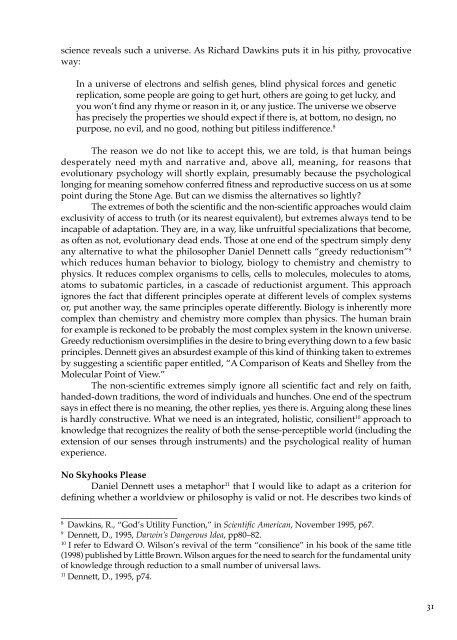The Spirit in Human Evolution - Waldorf Research Institute
The Spirit in Human Evolution - Waldorf Research Institute
The Spirit in Human Evolution - Waldorf Research Institute
Create successful ePaper yourself
Turn your PDF publications into a flip-book with our unique Google optimized e-Paper software.
science reveals such a universe. As Richard Dawk<strong>in</strong>s puts it <strong>in</strong> his pithy, provocative<br />
way:<br />
In a universe of electrons and selfish genes, bl<strong>in</strong>d physical forces and genetic<br />
replication, some people are go<strong>in</strong>g to get hurt, others are go<strong>in</strong>g to get lucky, and<br />
you won’t f<strong>in</strong>d any rhyme or reason <strong>in</strong> it, or any justice. <strong>The</strong> universe we observe<br />
has precisely the properties we should expect if there is, at bottom, no design, no<br />
purpose, no evil, and no good, noth<strong>in</strong>g but pitiless <strong>in</strong>difference. 8<br />
<strong>The</strong> reason we do not like to accept this, we are told, is that human be<strong>in</strong>gs<br />
desperately need myth and narrative and, above all, mean<strong>in</strong>g, for reasons that<br />
evolutionary psychology will shortly expla<strong>in</strong>, presumably because the psychological<br />
long<strong>in</strong>g for mean<strong>in</strong>g somehow conferred fitness and reproductive success on us at some<br />
po<strong>in</strong>t dur<strong>in</strong>g the Stone Age. But can we dismiss the alternatives so lightly?<br />
<strong>The</strong> extremes of both the scientific and the non-scientific approaches would claim<br />
exclusivity of access to truth (or its nearest equivalent), but extremes always tend to be<br />
<strong>in</strong>capable of adaptation. <strong>The</strong>y are, <strong>in</strong> a way, like unfruitful specializations that become,<br />
as often as not, evolutionary dead ends. Those at one end of the spectrum simply deny<br />
any alternative to what the philosopher Daniel Dennett calls “greedy reductionism” 9<br />
which reduces human behavior to biology, biology to chemistry and chemistry to<br />
physics. It reduces complex organisms to cells, cells to molecules, molecules to atoms,<br />
atoms to subatomic particles, <strong>in</strong> a cascade of reductionist argument. This approach<br />
ignores the fact that different pr<strong>in</strong>ciples operate at different levels of complex systems<br />
or, put another way, the same pr<strong>in</strong>ciples operate differently. Biology is <strong>in</strong>herently more<br />
complex than chemistry and chemistry more complex than physics. <strong>The</strong> human bra<strong>in</strong><br />
for example is reckoned to be probably the most complex system <strong>in</strong> the known universe.<br />
Greedy reductionism oversimplifies <strong>in</strong> the desire to br<strong>in</strong>g everyth<strong>in</strong>g down to a few basic<br />
pr<strong>in</strong>ciples. Dennett gives an absurdest example of this k<strong>in</strong>d of th<strong>in</strong>k<strong>in</strong>g taken to extremes<br />
by suggest<strong>in</strong>g a scientific paper entitled, “A Comparison of Keats and Shelley from the<br />
Molecular Po<strong>in</strong>t of View.”<br />
<strong>The</strong> non-scientific extremes simply ignore all scientific fact and rely on faith,<br />
handed-down traditions, the word of <strong>in</strong>dividuals and hunches. One end of the spectrum<br />
says <strong>in</strong> effect there is no mean<strong>in</strong>g, the other replies, yes there is. Argu<strong>in</strong>g along these l<strong>in</strong>es<br />
is hardly constructive. What we need is an <strong>in</strong>tegrated, holistic, consilient 10 approach to<br />
knowledge that recognizes the reality of both the sense-perceptible world (<strong>in</strong>clud<strong>in</strong>g the<br />
extension of our senses through <strong>in</strong>struments) and the psychological reality of human<br />
experience.<br />
No Skyhooks Please<br />
Daniel Dennett uses a metaphor 11 that I would like to adapt as a criterion for<br />
def<strong>in</strong><strong>in</strong>g whether a worldview or philosophy is valid or not. He describes two k<strong>in</strong>ds of<br />
_________________________<br />
8<br />
Dawk<strong>in</strong>s, R., “God’s Utility Function,” <strong>in</strong> Scientific American, November 1995, p67.<br />
9<br />
Dennett, D., 1995, Darw<strong>in</strong>’s Dangerous Idea, pp80–82.<br />
10<br />
I refer to Edward O. Wilson’s revival of the term “consilience” <strong>in</strong> his book of the same title<br />
(1998) published by Little Brown. Wilson argues for the need to search for the fundamental unity<br />
of knowledge through reduction to a small number of universal laws.<br />
11<br />
Dennett, D., 1995, p74.<br />
31
















